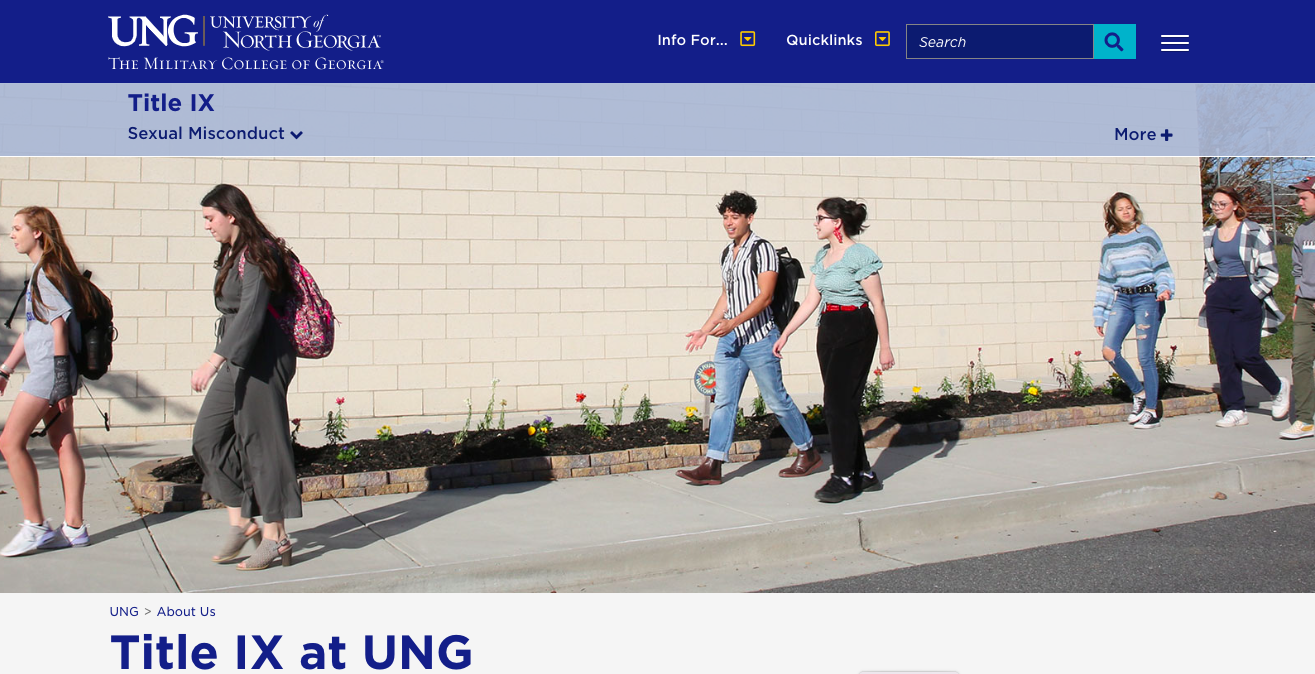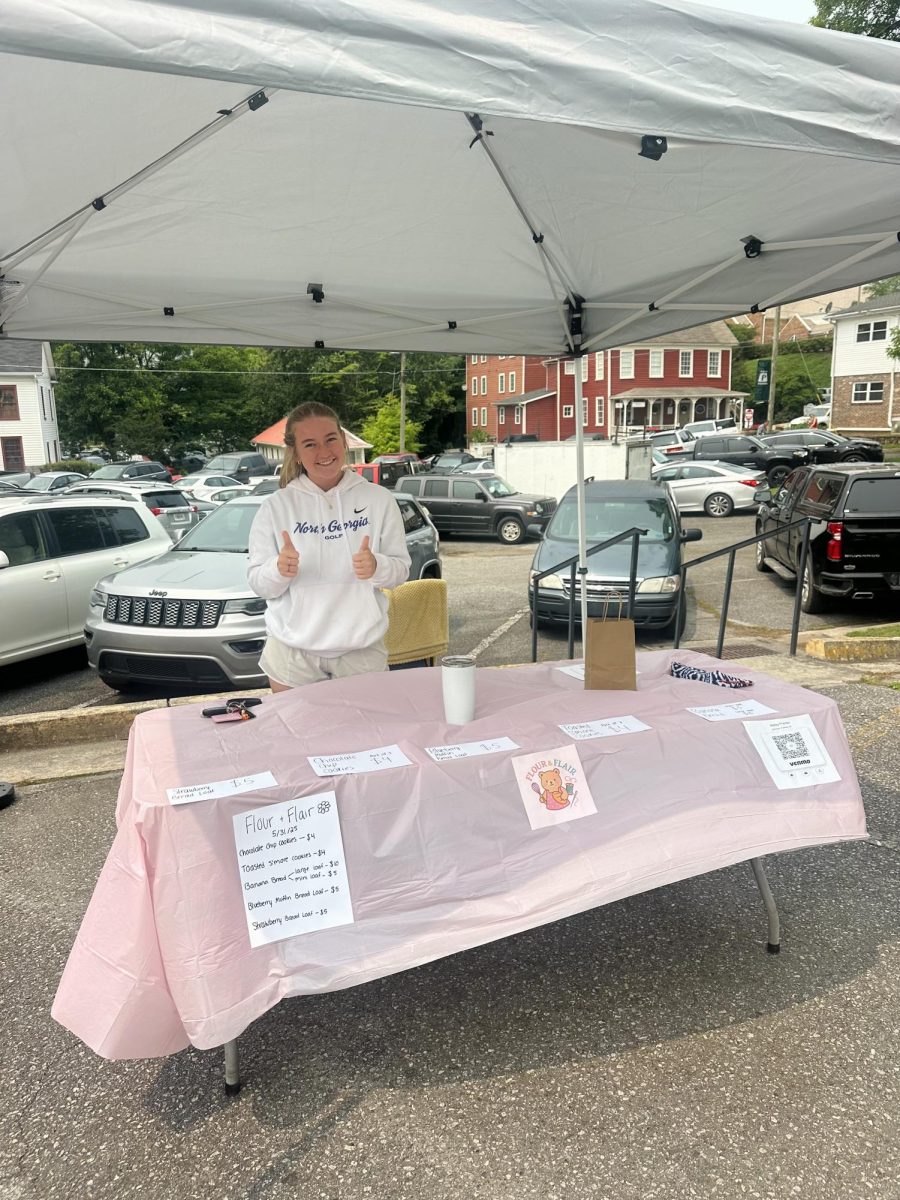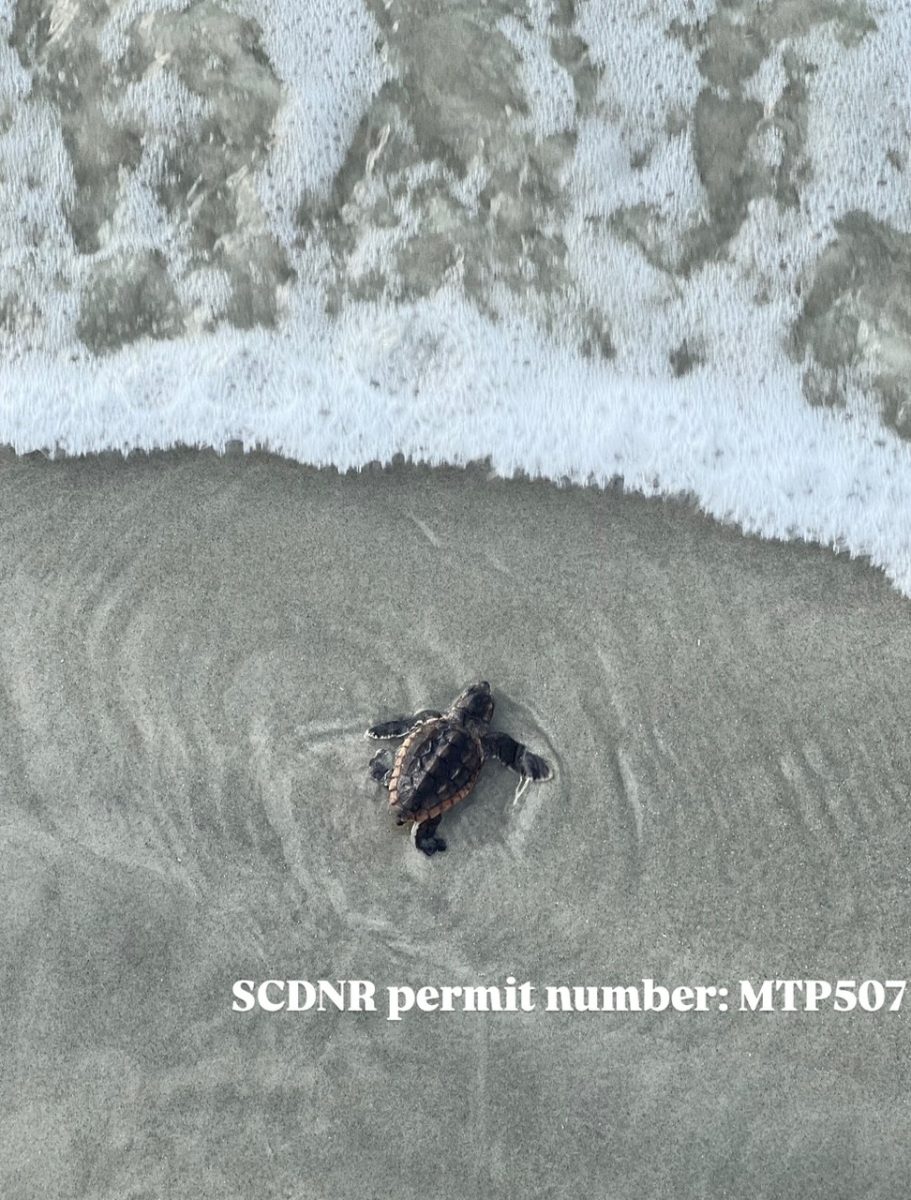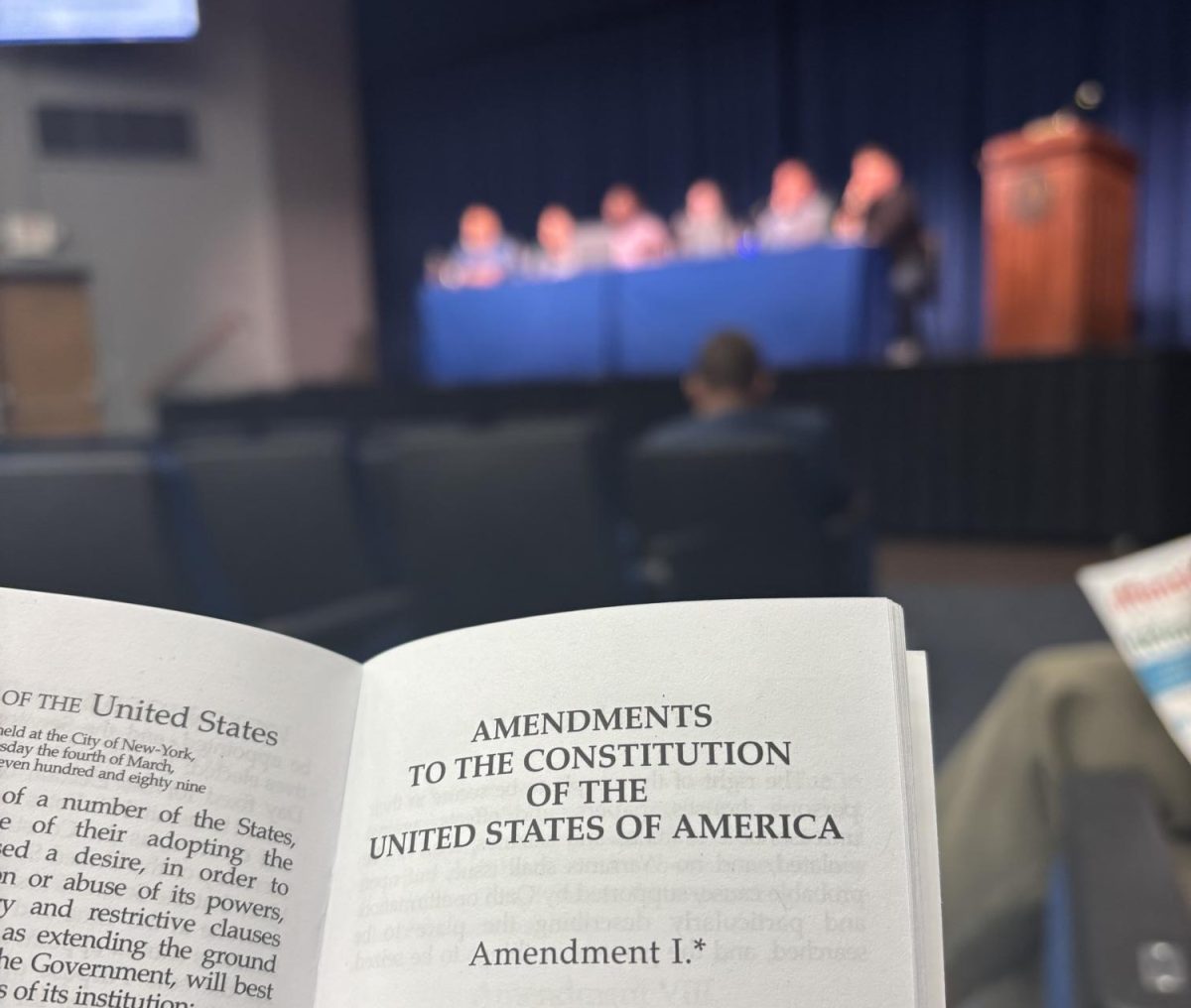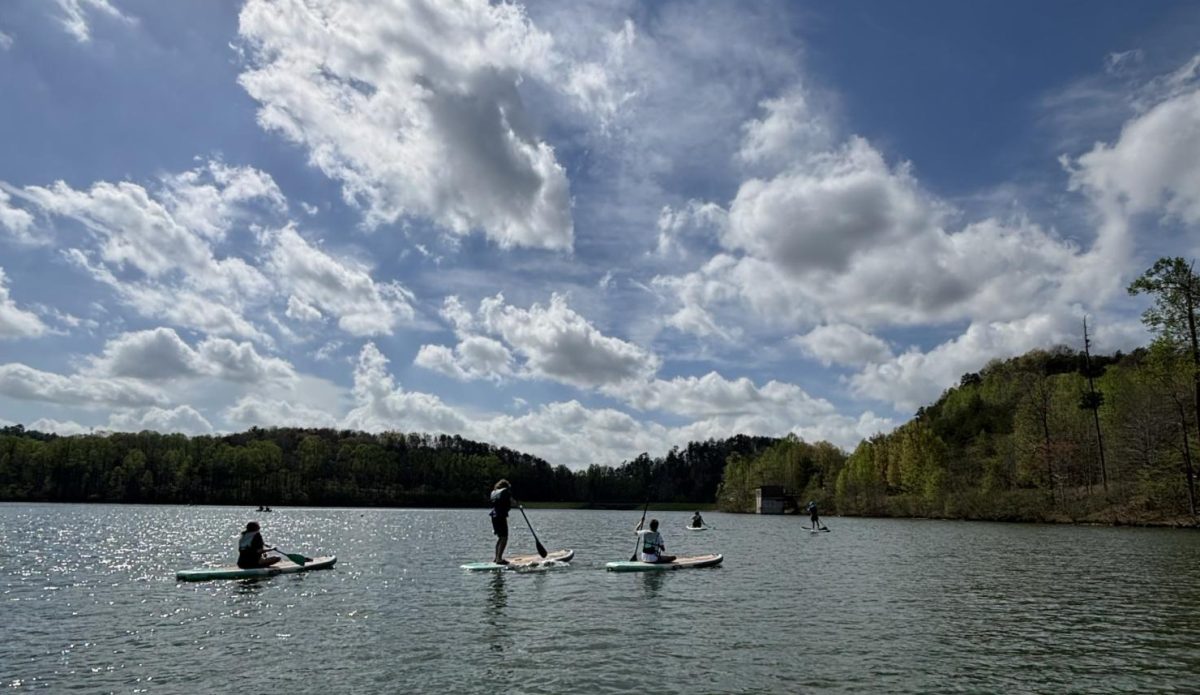The University of North Georgia’s Title IX office offers support and resources for students in instances of sexual misconduct.
UNG Title IX Coordinator Misty McDonald said, “Title IX offers supportive measures that are available to any individual who has been involved in sexual misconduct, even if they do not wish to file a formal complaint or participate in an investigation.” McDonald said her job is to support all students, both complainants and respondents.
Title IX is meant to provide supportive measures for students, which includes categories of general aid, health and safety, academics, on-campus living and activities, on-campus working environment and no-contact orders. These categories are further expanded and provide more details on what specific assistance is offered. For a deeper look into UNG Title IX’s newest draft of supportive measures, reach out to McDonald or visit UNG’s Title IX website.
UNG’s 2022 Sexual Misconduct Report shows there were 166 reports submitted involving sexual misconduct and Title IX sexual harassment. Of those 166 reports, 43 were dismissed, 118 had no investigation, four had formal investigations and one had an informal investigation. Reasons for no investigation were 37 instances of complainant request, 57 instances where Title IX reached out and received no response, four instances where the people involved were not in the UNG community of students, faculty and staff, 12 instances where informal investigations occurred, and eight instances that were revealed to be other forms of abuse that were sent to Human Resources or Student Conduct.
McDonald emphasized that, although the numbers at first seem startling, when you break them down and look at the reasons behind these decisions, most of the time these complaints are dismissed from Title IX because they do not hold the criteria required to be Title IX cases or that complainants request to not have investigations.
“I think a lot of people hear sexual misconduct and they think sexual assault cases. One thing, based on research on a national level is that dating violence is one of the biggest things that happens on a college campus, but it doesn’t get reported because people don’t know it’s a violation of sexual misconduct, but probably bigger than that, people don’t realize they are in an abusive situation,” said McDonald. “Stalking, dating and domestic violence, sexual exploitation, are violations of our sexual misconduct policy. It doesn’t have to have the word sex in it to be sexual misconduct.”
“I think there’s a perception that if it gets reported to Title IX then there must be an investigation and that freaks people out, and that’s not the reality. The reality is that if it gets reported I reach out and say ‘how can I support you’ and provide them options to move forward in their case,” said McDonald. The only time cases are sent directly to the police is if a vulnerable population like minors or elders are involved.
The following is an interview with UNG junior Grace B. who opened up about her experience with sexual assault on campus.
Q. Who did you report the incident to? Was it the police or UNG and who did you speak with directly if you remember?
A. Officer Sosebee from the UNG police department is who I reported it to. My detective was Officer Weiner.
Q. Did anyone follow up with you to explain why it got dismissed?
A. My detective informed me that the case was dismissed via text and my dad emailed him and that’s when we were given the number to the DA’s office where I called to get an explanation.
The text message said, “Hello, the DA’s office has returned with a decision on your case. They do not believe the case is prosecutable, therefore warrants will not be sought. I understand this is not the result you wanted, and I wish it could be different. I strongly encourage you to utilize our new in-house victims advocate and/or Rape Response to help support you. Please let me know if you have any questions.”
Q. Does the student still go to UNG and how is your relationship with them now?
A. Sadly, this student still goes to UNG. He is a cadet at the university, and I believe that is why UNG and Lumpkin County were protecting him. I see him occasionally. My reaction to seeing him has gotten better and I do not run away crying anymore, but I do still have a lot of fear when I see him.
Q. If the school was involved, what was the process like going through Title IX and who did you talk to if you remember?
A. I was originally reached out to by Title IX and we met, and they told me to let them know if I decided to press charges. I never really got back to them because I was hoping the police station would be handling everything. After the case was dismissed, I reached back out to Title IX and they basically informed me that there was not much they can do because he was not convicted.
Q. How have you coped and how have you been able to move forward in your healing journey?
A. I am in intensive therapy. Including regular counseling, therapy and EMDR. These are to help disassociate my fears and help me live my life as normally as possible with all of my flashbacks and PTSD attacks. I have been diagnosed with PTSD and I do have a lot of my family helping me along this journey, but it is really hard sometimes. Some days I can barely even get out of bed and I just remember all the things that I let him do to me. I did have to have surgery because of him, and I do still have complications with my wrist to stay because of it.
Grace B. said that when the Title IX office reached out to her, she did not seek help until after her case was dismissed only to find out that Title IX cannot open a new investigation if there is no due process or if it has been dismissed legally.
Grace B. said she feels like the legal system failed her and that she wished she would have gotten justice for her case. She revealed that the DA involved in the case took more than a year to investigate and she felt like that was not good enough.
At the time of her assault, Grace B. was a freshman living in the dorms of UNG. The Lumpkin County DA involved in her case said that because she waited eight days to report it, the injury could have occurred from another instance. Grace B. says that her witness wasn’t enough to back up her claims and that the DA felt there was not enough evidence for a case.
The following is from an email interview with UNG campus police.
Q. What determines if a case can be prosecuted or not?
A. Simply put: the facts and evidence of the case. To obtain arrest warrants for a case, police need probable cause, which is defined as facts or circumstances that would make a reasonable and prudent person believe a crime has been or is being committed. Every case is different, so our standard practice for sexual assault cases is to consult the appropriate District Attorney’s Office for their review of the case. They then decide, based on the facts and evidence of the case, whether they believe we have enough to prosecute the case. It’s important to note that probable cause is not as high of a threshold as “beyond a reasonable doubt”, which is what is needed to convict someone. If they believe there is enough to prosecute, we then go before a judge to obtain the arrest warrants or bring the case before the grand jury. If going before a judge, the judge listens to the facts and circumstances of the case and decides if there is probable cause that the accused committed the crimes we are alleging.
Q. How does Campus police handle investigations and their involvement in sexual misconduct cases?
A. Our involvement largely depends on the wishes of the survivor. Sexual assault investigations and the possible subsequent prosecution can be tough for survivors as they must relive their trauma, so we offer as much support as possible to help ease the process for them. Some survivors report to us, some report to Title IX, some report to neither, and some report to both. For those who report to us, some meet with us to just go over their options and don’t want anything else done, while others want the case documented in case things escalate or come up in the future. Many want a criminal investigation as well, so in those cases, we either investigate the case or assist them in reporting it to the law enforcement agency that has jurisdiction (if it occurred outside UNG Police jurisdiction). We understand the criminal justice process can be confusing and difficult to navigate, so we work hard to help people through the process. While we must remain unbiased factfinders in every case, we take survivors at their word. One common challenge survivors face when deciding whether to report their assault is a belief that they won’t be believed by either their family, peers, or law enforcement. We want survivors to know that we believe them and will respect their wishes and if they want, thoroughly investigate their assault.
Q. What support is offered to students by the campus police?
A. We believe that if a survivor needs something that we cannot offer, we will help connect them with someone who can. Within our department, we offer several resources to survivors that will help them from when they first contact us to when their case reaches a conclusion. First, all our officers get trained on a trauma-informed approach. This means that officers are taught how to gently approach survivors who report to us while reducing their re-victimization. For example, patrol officers who respond to a report of a sexual assault will likely need to determine some basic facts, but they are taught to not make the survivor tell the entire account of the assault as this will be done later in an interview with an investigator. We try to limit how many times a survivor must recount their assault. They are also taught to promptly notify our Criminal Investigations Division and our in-house Victim Advocate so we can respond effectively. It is exceptionally rare for police departments to have their own victim advocate; however, we understand the value an advocate provides to survivors and victims of all types of crime. Our Victim Advocate is dedicated to serving the best interest of the survivor and acts to empower them to make informed decisions during difficult times. The advocate aims to provide a personalized approach to each survivor by listening, supporting, and identifying specific resources to meet the needs of the survivor. The advocate can help survivors by meeting with them prior to filing a report to explore options, resources and explain the criminal investigation process. The advocate can also respond with patrol officers as they respond to a report of sexual assault to provide support for the survivor and work directly with the officer to ensure the survivor is comfortable, their needs are being met, and provide resources. The advocate can work with the survivor from the initial report to the conclusion of the investigation, and beyond. They can attend any interview and meeting with law enforcement, community resource agencies, and campus partners (such as Title IX and Dean of Students) to assist the survivor with navigating these resources and systems. The advocate can continue to meet with the survivor and help with things like developing a personalized safety plan, learn about coping strategies and long-term resources the survivor can turn to throughout their time at UNG and for their lifetime for support. Resources the advocate can provide include, but is not limited to; emotional support, explanation of the survivors’ rights, connection to counseling, community, and medical services, assistance with filing a police report, navigating campus resources, assistance with excused absences & hardship withdrawals, familiarization with law enforcement & the criminal justice system, and getting oriented with a courtroom setting & proceedings.
Q. How do you help students feel safe on campus when it comes to sexual misconduct if their case can be prosecuted? What if the case is thrown out?
A. Regardless of whether a case is prosecuted or not, we want our students to feel safe on campus. While the Dean of Students Office can offer things such as no-contact orders to help survivors avoid contact with their assailant, we can help them through the process of getting a protective order which serves a similar purpose. Our Student Night Auxiliary Patrol (SNAP) offers safety escorts around the Dahlonega campus at night (Monday-Thursday), and our police officers can also give these when/where SNAP is not available. We also have the LiveSafe app, which allows students to directly contact us via phone call or text. The app has a panic button function that will give us the caller’s coordinates when they call (if they have location permissions correctly set). We also conduct an annual safety walk in partnership with the Student Government Association to identify areas on campus as night that could be improved for safety (poorly lit areas, overgrown bushes, etc).
Q. How many instances are reported in an academic year?
A. For statistics on how many reported sexual assault cases we have had, we recommend people refer to the Annual Safety & Fire Report which is available on our website. This report will show these numbers, among other types of reports for each campus over the past three years.
Q. Does the university and the campus police try to avoid these cases or try to hide/cover the up for any reason?
A. We never try to hide/cover up sexual assaults. Not only would this violate federal law, but this would violate the trust of those we swear to protect. As shown by the Jeanne Clery case and subsequent legislation, people need to have a realistic understanding of safety statistics on university campuses. We believe in transparency and want our community to know what’s going on, so as part of the Clery Act, we post our daily crime log on our website. This log is updated daily and lists all the Department of Public Safety reports for the past 60 days. These reports include Clery reportable offenses (which include sexual assaults) reported to the Department of Public Safety.
Q. Do you ever disagree with the DA on their decisions for these cases?
A. We would not be able to do what we do without the partnership of our various District Attorney’s Offices. Along with several other law enforcement agencies, we work with local DA’s Offices to annually review the judicial circuits’ Sexual Assault Protocols, which are manuals for how sexual assault reports should be handled by all parties involved. Rape Response, a local sexual assault non-profit, plays a large role in this annual review. Our job is to document and investigate reports of criminal activity, while the DA’s Office’s job is to prosecute these cases. Prosecuting a sexual assault case typically takes an immense amount of effort and skill, as defendants in these cases have a lot to lose if found guilty. We trust the decision-making of our DA’s Offices, which is why we refer to them to review our sexual assault cases when we near the conclusion of our investigations.
Q. Can you give any legal explanation to the terms of “rape” in the safety reports of 2022 in which rape is defined by an act only happening to a female student (found on page 8, category rape)? Does the University not acknowledge that male students can also be raped?
A. You will commonly see us work with different definitions because the federal legislation we must follow uses the federal definitions, while we use Georgia definitions for our criminal investigations. In Georgia law, it mainly comes down to what sex organs are involved. For example in Georgia law, “Rape” is defined as when someone has carnal knowledge of either a female forcibly and against her will; or a female who is less than ten years of age. This means that it must be a penis into a vagina, even just the anterior portions. 1923 case law states that “forcibly” does not mean it has to be overbearing force, rather, it need only be slight.
Men can absolutely be sexually assaulted too. In Georgia law, the male equivalent to rape is Aggravated Sodomy which is defined as when someone commits sodomy with force and against the will of the other person or when someone commits sodomy with a person who is less than ten years of age. Both definitions are very similar and the possible sentences for both are too. On the federal side of definitions, the term rape is covers both. Federally, rape is defined as penetration or attempted penetration, no matter how slight, of the vagina or anus with any body part or object, or oral penetration by a sex organ of another person, without the consent of the victim.
Q. Please include any information you think is necessary for students and staff to know about sexual misconduct on campus and any statements you wish to share that was not covered above.
A.The UNG Department of Public Safety takes all cases of sexual misconduct seriously. If you are a survivor of sexual assault, whether on campus or not, we believe you and are here to help you. If you want to speak with police, you can reach our central dispatch at 706-864-1500. If you are unsure if you want police involvement, need help navigating other university processes such as Title IX, or want help connecting with third-party local groups such as Rape Response, you can contact Victim Advocate Courtney Hause at [email protected]. If you want help but prefer to get help solely outside of UNG from third-parties, you can call the National Sexual Assault Response Line at 1(800) 656-4673 or call Rape Response at (770) 503-7273.
If you or someone you know is experiencing any sexual misconduct, please visit the links below for more information on how to get help.
Title IX Office: (706) 867-4560

